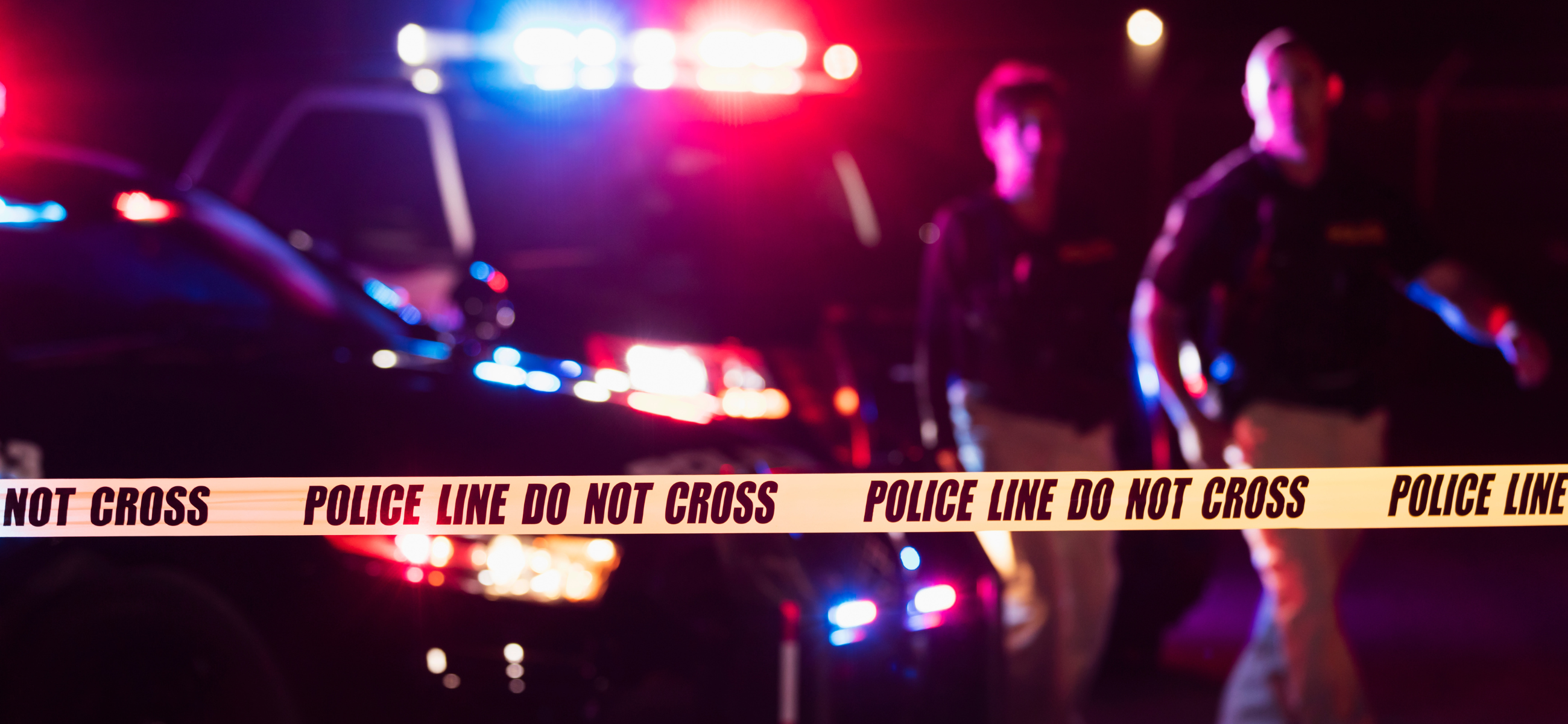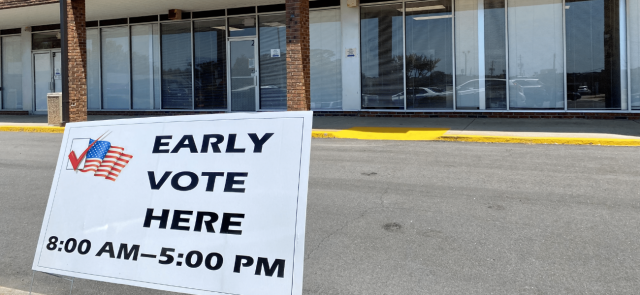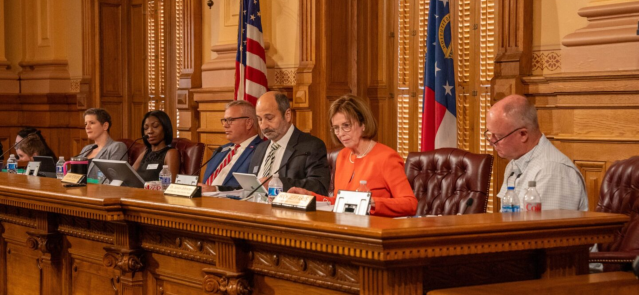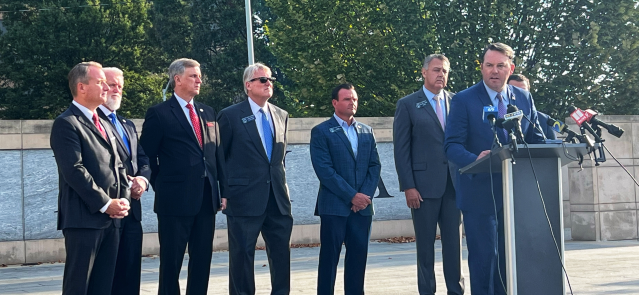Stay ahead of the curve as a political insider with deep policy analysis, daily briefings and policy-shaping tools.
Request a DemoOfficer-involved shooting deaths are down in Georgia. But more needs to be done

Police officers at a crime scene. (Credit: kali9)
- Deaths for the first half of this year are down over 25% from the same time a year ago.
- Officer-involved shootings are projected to fall about 20% by the end of the year, one expert predicts.
- More accountability is needed, families of shooting victims and legal experts say.
Shootings and deaths in Georgia at the hands of law enforcement are on the decline, according to state data released this month.
In the first six months of this year, there were 41 shootings compared to 47 during the same time period in 2023, according to data collected by the Georgia Bureau of Investigation. If the current pace of shootings continues, one expert predicts, officer-involved shootings could be down 20% by the end of the year.
Despite what some see as promising numbers, they are of little comfort to Mya Cullins.
Cullins’ oldest child, Nygil, was killed by Atlanta police two years ago at Fogo de Chão, a Buckhead restaurant where he once worked. The 22-year-old was suffering from a mental health crisis at the time of his death, his mother told State Affairs. The Cullins family has spent the last two years in emotional and legal turmoil trying to get answers and clarity.
“Throughout the whole process, not just for me but for all parents and families that have dealt with this, the struggle is the transparency,” the Henry County mother told State Affairs. “Allowing the families to see the body cam footage, to know the truth of what happened, prosecuting and charging these officers with wrongful death, which obviously is murder… and not taking so long dragging their feet. A family is already grieving. We shouldn’t have to wait countless numbers of years to find out what’s going on.”
The family filed a federal lawsuit in May against the City of Atlanta, the restaurant and others. A month later, authorities finally released 911 calls, surveillance video of the moments leading up to Nygil Cullins’ death and body camera footage of the shooting after two years of requests.
“It’s very tough,” Georgia Bureau of Investigation director Chris Hosey said when told about the concerns of victims’ families. Whenever his agency is called in to investigate, they turn the findings over to the proper authorities, usually the district attorney’s office, and that’s normally about 90 days, he said. They do not analyze the data.
“I feel for the families that are involved,” said Hosey, who has been director since last August. “There are instances where the family has nothing to do with the situation that took place. They’re just wanting answers about what happened to their family member. What we have to do as an agency is balance that with what we can release to maintain the integrity of the investigation as well as that of our agents and supervisors.”
The Atlanta Police Department and the Georgia Bureau of Investigation have not commented on the Cullins case.
Stemming the tide
To find out what’s behind the declining number of police shootings, State Affairs spoke with activists, lawmakers, lawyers, law enforcement groups and the head of the Georgia Bureau of Investigation, which collects data on officer-involved shootings. Some credited the drop to greater training and use of body cameras.
“I would first attribute it to more awareness among the officers of mental health issues, more training dealing with people, more training in general about how to de-escalate,” Terry Norris, executive director of the Georgia Sheriffs’ Association, told State Affairs.
“Overall, our pool of officers throughout the state and the nation have made some strides in handling those highly volatile situations in better ways.”
But those measures aren’t consistent — or enough, some observers say.
Eight states, including neighboring South Carolina, have state laws requiring law enforcement officers to wear body cameras. Georgia does not have such a law. That decision is left to counties and cities. Many small and rural departments often can’t afford the bodycams, which can cost up to $1,700 apiece.
Between 2020 and the first six months of 2024, Georgia has had 452 officer-involved shootings which resulted in 220 deaths, according to bureau data. Many of the encounters involved 911 calls, domestic disputes, traffic stops and wellness checks.
The data does not capture all officer-involved shooting incidents in Georgia, just the ones that the bureau is called in to investigate, Hosey told State Affairs.
But it is the only record that provides a glimpse of police encounters with the public in Georgia.
The Federal Bureau of Investigation created the National Use-of-Force Data Collection in 2016 at the request of law enforcement groups that saw a lack of nationwide data on the topic. But only a fraction of law enforcement agencies submit data. Thus, there’s no authoritative database to track police use of force data — which includes officer-involved shootings — at a state or national level.
“There’s no publicly available database that tracks this,” Atlanta attorney Gerald Griggs told State Affairs.
Nationally, an average of 1,769 people were injured each year in police shootings from 2015 to 2020, according to a study released in March by the Johns Hopkins Center for Gun Violence Solutions and Vanderbilt University. The study found 55% — or 979 — of those people were killed. The majority of the victims — 84% — were reported to be armed with a firearm or other weapon, such as a knife or a vehicle. The six-year study looked at 10,308 incidents involving shootings by police.
Mapping the violence
While Georgia’s police shootings and deaths appear to be declining, the problem remains dire nationally.
Harvard University’s Mapping Police Violence project began tracking police killings about a decade ago after being unable to get reliable data from law enforcement agencies.
As of the end of June, 704 people had died as a result of police shootings nationwide this year so far , according to the database housed at Harvard’s Global Health Education and Learning Incubator in Cambridge, Mass.. That’s 56 more people than the same time a year ago. So far this year, there have been nine days during which someone in America didn’t die at the hands of police, the project noted.
Meanwhile, Georgia’s officer-involved shootings appear to have dropped during that same period.
“It’s halfway through the year. So if everything holds, you should be at 80 [officer-involved shootings by the end of the year], which represents a 20% drop [from 2023],” Jonathan Newton, president and founder of the National Association Against Police Brutality in Washington, D.C., told State Affairs.
Deaths resulting from shootings during that time also have fallen: From January to July 1, 15 people died after being shot by police, down from 20 in the first six months of 2023. This year’s numbers are down over 50% from 2022, when 31 people died.
Last year, Georgia had 103 officer-involved shootings — roughly two shootings a week, resulting in 48 deaths. That’s down from 2022 when there were 112 officer-involved shootings and 53 deaths, GBI data shows.
Many of the encounters involved 911 calls, domestic disputes, traffic stops and wellness checks.
A look at five years of GBI data on officer-involved shootings found:
- The majority of shootings occurred in counties in and around metro Atlanta. Nearly 56% — or 253 — of the 452 officer-involved shootings that took place between 2020 and the first six months of this year occurred in metro Atlanta, GBI data shows.
- The majority of the officer-involved shootings that led to deaths over the last five years were in metro Atlanta. During that time, metro Atlanta had 127 — nearly 58% — of the state’s 220 officer-involved shooting deaths.
- Fatalities resulting from officer-involved shootings overwhelmingly involved men. GBI data showed only three officer-involved shooting deaths involved women.
- The youngest victim was Vincent Demario Truitt. The 17-year-old died in July 2020 during a police chase in which he and two other teens were reportedly in a stolen vehicle, GBI reports said.
- The oldest victim was Wendall Cross. The 85-year-old Blairsville resident was killed in February when Union County officers responded to a 911 domestic call involving a gun. Cross was armed with a gun. Officers told him to put it down. He fired at them and they returned fire, according to GBI reports.
Atlanta activist and radio personality Derrick Boazman attributes the apparent drop to the activism and protests that emerged in recent years after several police killings drew national attention. In March 2020, 26-year-old Breonna Taylor was fatally shot in Louisville, Ky., after police officers forced their way into her apartment during an investigation into a drug dealing operation.
Closer to home, the shootings of Rayshard Brooks and Manuel Paez Terán also may have played a role, Boazman said. Brooks was killed in June 2020 at an Atlanta Wendy’s drive-through after police received complaints he was asleep in the lane. The encounter ultimately led to Brooks being shot when police tried to arrest him after a breathalyzer test. In January 2023, Georgia state troopers shot and killed Terán, an environmental activist, during protests at the Atlanta Public Safety Center known as “Cop City.” Charges were dropped against officers in both cases.
Most notably, Boazman and others say, the death of George Floyd at the hands of Minneapolis police, while not a shooting incident, has had a “chilling effect” on law enforcement nationwide and is making officers “think twice” about their conduct, said Boazman, a former Atlanta city councilman. Derek Chauvin, the police officer who held his knee on Floyd’s neck, for instance, is serving a 21-year federal sentence for violating Floyd’s civil rights and a 22-and-a-half-year sentence for second-degree murder.
Additionally, law enforcement and other experts attributed the decline in Georgia’s numbers to more training and greater use of body cameras.
“Officers are getting more training in de-escalation techniques,” said Jeff Turner, commission chair in Clayton County where he once served as police chief. “Officers are asked to do a whole lot in the first place, but when you’re able to be more empathetic with somebody, then you know how to de-escalate [the situation]. Then, you got the crisis intervention training. So those [two types of training] have been pushed a whole lot in police circles, especially in Clayton County. So we try to encourage the police department, the chief, and he’s totally on board with it, to give our officers and deputies as much training as possible. That benefits us.”
Body cameras also have been particularly helpful in providing real-time evidence of what happens during a police encounter, Turner said.
“Everyone, every law enforcement agency should be mandated to have body cams,” Turner said. “I know sometimes it comes down to dollars and cents, but when actions need to be clarified, that body cam goes a long way. A picture is worth a million words.”
Andy Griffith or Dirty Harry?
But recent legislative efforts to require police in Georgia to wear body cameras haven’t fared well.
Rep. Tanya Miller, D-Atlanta, introduced a bill in 2023 that required police in Georgia to wear body cams. The bill, known as The Transparency in Policy Act, didn’t go anywhere. Miller is an attorney who has represented families of victims who experienced excessive force from police.
Sen. Derek Mallow, D-Savannah, also has worked with Sen. Sonya Halpern to get similar legislation in the state senate.
“We want that to be law, that you have to have a body camera on and it has to be active if you’re responding to a scene or anything, because should something happen to the officer, how would we know who the assailant was?” Mallow said. “How would we know if they weren’t wearing a body cam? That’s why I think it’s equally important for all law enforcement agencies to wear body cameras.”
Without them, Mallow said, “it only becomes a one-sided statement because the dead can’t speak. Body cams speak for the person who is deceased. That’s extremely important. We can either be Andy Griffith or Dirty Harry. I hope that we have more Andy Griffiths policing our communities than Dirty Harry.”
Remembering Nygil
Griggs, an Atlanta attorney who has represented over 15 cases involving victims of officer-involved shootings and another 100 in advocacy work in the last 20 years, doesn’t believe the numbers are falling. He believes they consistently number around 100 shootings a year in recent years, with about half being fatal.
“That’s a real problem. Transparency is lacking. The accountability is lacking,” Griggs said. “Are we talking about how many officers were fired? How many officers were held accountable? How many officers were prosecuted? How many officers were cleared? None that’s in these statistics.”
More accountability is needed, Griggs argues.
“I know the argument has been training, training, training,” Griggs said. “Training is not going to account for this. What’s going to count to stop this is holding folks accountable, meaning that there needs to be a few people to go to prison. And I promise you, these numbers will come down.”
In the meantime, Mya Cullins continues to call for more police reform and is doing things to honor her son’s memory and promote community healing. The family hosts back-to-school drives and feeds over 300 people during Thanksgiving and Christmas to honor Nygil who was born on Christmas Day.
His mother opened a transportation company in honor of Nygel and, as a filmmaker, she makes sure that each film she makes includes a character with his name.
Despite those efforts, Nygil’s death remains ever-present.
“It impacted our family,” Mya Cullins said. “My kids no longer can call on Nygel if they need him. He’s not here to spend time with my new grandbaby, which would be his niece. He’s not here to celebrate his youngest brother getting over 30 offers to play football. He’s not able to see his other brother … getting his degree in business management. My family is still moving on and making accomplishments but Nygel is not a part of that.”
| Officer-involved shootings and fatalities in Georgia: At a glance | ||
| Year | Shootings | Death |
| 2024* | 41 | 15 |
| 2023 | 103 | 48 |
| 2022 | 112 | 54 |
| 2021 | 100 | 58 |
| 2020 | 96 | 45 |
| TOTAL | 452 | 220 |
| *As of July 1, 2024 | ||
| Six-month snapshot of officer-involved shootings (January-July 1) | ||
| Year | Shootings | Death |
| 2024 | 41 | 15 |
| 2023 | 47 | 20 |
| 2022 | 64 | 31 |
| 2021 | 51 | 29 |
| 2020 | 51 | 22 |
| TOTAL | 254 | 127 |
Find out more about officer-involved shootings in Georgia here.
Have questions, comments or tips? Contact Tammy Joyner on X @lvjoyner or at [email protected].
Election administrators ‘in limbo’ over new voting rules, top official says
If you plan to hand-deliver your absentee ballot to your local election office this year, you’ll have to show identification and sign a form stating whose ballot you’re dropping off, under a new rule recently passed by the State Election Board. If you fail to show your ID or don’t complete the form, your ballot …
Weekend Read: State Election Board marks its 60th year mired in controversy. Here’s what happened.
In 1964, Georgia lawmakers retooled the state’s election process to create a “one person, one vote” system after the U.S. Supreme Court outlawed the “county unit system” that held sway over Peach State politics for nearly half a century. Until then, politicians hoping to win primaries in Georgia had to capture entire counties, not just …
State lawmakers: Atlanta, give detention center to Fulton to fix problem-plagued jail
Atlanta city officials need to give the Atlanta Detention Center to Fulton County to ease overcrowding in the county’s violence-prone jail, a bipartisan panel of state lawmakers said in its final report, released Friday. “A big part of the solution is that the City of Atlanta needs to turn over the Atlanta Detention Center to …
Georgia plays a prominent, although louder, role at this convention, too
As the second of the two biggest political party events wraps up this evening in Chicago with Vice President Kamala Harris accepting the Democratic presidential nomination, all eyes in Georgia are turning to the grand finale — the Nov. 5 election. “We are all energized because we know we are bringing back hope for our …




